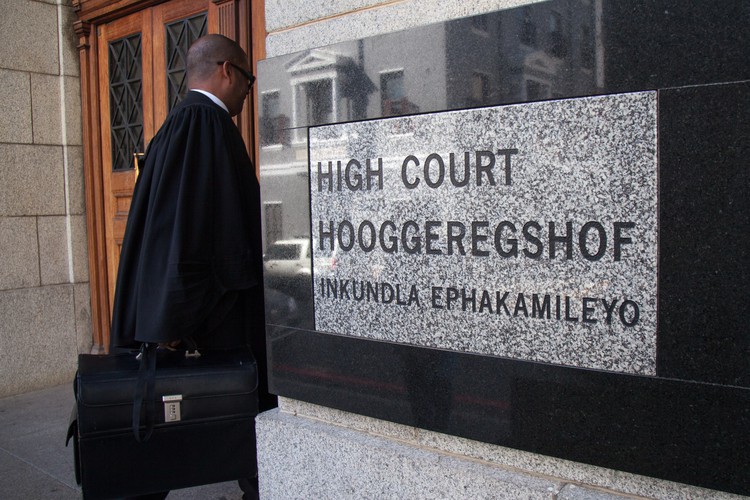

A judge’s failure to provide reasons for a court order has meant that a man has been unable to exercise his right to apply for leave to appeal. Archive photo: Ashraf Hendricks
11 September 2019
Western Cape High Court Judge Siraj Desai has failed to provide written reasons for a November 2018 judgement involving the removal of a child from the United States to South Africa.
Desai was one of three judges reported to the Judicial Service Commission earlier this year for late judgements.
The original application in terms of The Hague Convention on the Civil Aspects of International Child Abduction was filed in the Western Cape High Court in March 2016, presided over by Desai. The application was filed after the child’s mother came to South Africa from Ohio, where the child was born, and did not return to the United States. The father remained in the United States.
Desai handed the case over to Ohio courts to determine the legitimacy of the couple’s marriage, as they were originally married in a Muslim Rights Ceremony in South Africa. In November 2016 the Ohio courts found that the marriage was valid and the mother did not have sole custody of the toddler.
After subsequent appeals in America were exhausted, Desai was set to hear the case on June 7, 2018. But the hearing was postponed when the sentencing of Henri van Breda was scheduled for the same day, and then postponed a second time while Desai recovered from surgery.
The case was eventually heard in September 2018, and judgment handed down on 5 November 2018 without reasons. Three weeks later the child’s father requested that Desai supply reasons for his judgment, which, the father claims, a requirement that he pay the mother more than he can afford to do.
Article 9 of the Code of Judicial Conduct says: A judge must resolve disputes by making findings of fact and applying the appropriate law in a fair hearing, which includes the duty to give adequate reasons for any decision.
The article also says that, while certain judgements do not require reasons, “if reasons in such cases are later reasonably required, they must be given within a reasonable time”.
On 14 June attorneys representing the child’s father met with Desai in his chambers to discuss the delay in providing reasons for his 5 November judgement. According to an email sent to the judiciary, Desai explained that he was “under the impression that the matter had been resolved” and so did not have to provide reasons for his judgement.
He offered to provide the attorneys representing the child’s father with reasons for his judgement by 28 June.
Spokesperson for the judiciary Nathi Mncube responded to GroundUp’s questions about the case with the following:
“Due to the length and complexity of the matter the order was made without reasons being furnished at that stage. Honourable Judge Desai was under the impression that the matter had been resolved by the parties. When it was brought to his attention that the matter had not been settled, he undertook to furnish the reasons as soon as possible.”
Mncube, who responded on 21 August, also said “the delay in furnishing reasons was occasioned by other commitments.” This is after Mncube told GroundUp that Desai was on leave at the time.
Despite this, Mncube said reasons would be provided by Tuesday, 27 August, almost ten months after the original judgment.
On 27 August the Judiciary spokesperson said that reasons would be handed down the following day. On the 28th, lawyers representing the father were told that Desai’s registrar had mixed up the dates, and reasons would be handed down on the 29th.
Judge Desai handed down verbal reasons for his 5 November 2018 ruling on 29 August 2019. However, at the time of publishing, no written and signed reasons had been handed down. Without a typed copy of the reasons, no application for leave to appeal can be made.
According to the Hague Convention, under which the original application was filed, “The judicial or administrative authorities of Contracting States shall act expeditiously in proceedings for the return of children.” South African Regulation Relating to Children’s Court and Child Abductions states that proceedings under the Hague Convention must be completed within six weeks unless ‘exceptional circumstances make this impossible.”
We first worked on this story weeks before being notified that Judge Desai would hand down reasons on 27 August. Upon being informed of this we decided not to publish the story, reasoning that doing so would be petty. We maintained this decision even after the two-day delay that followed. But two weeks later we have learnt that written reasons have still not been given. This means a party in the case still cannot apply for leave to appeal. We can see no further reason to delay or not run this story.
GroundUp has reported regularly on the problem of late judgments and Judge Desai’s name regularly comes up in this regard.
We have no view at all on the merits of the case discussed here. But a losing party in a case has a right to apply for leave to appeal, and that right should not be blocked by tardiness.